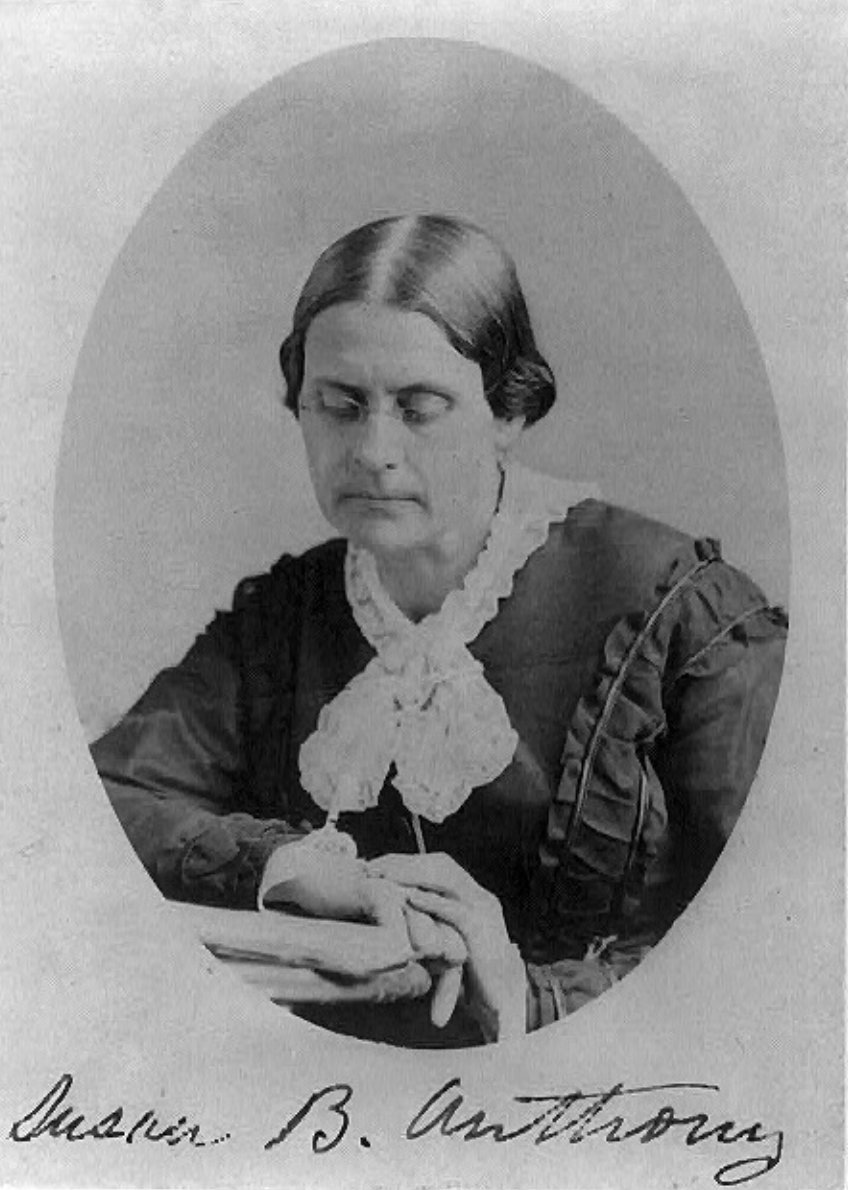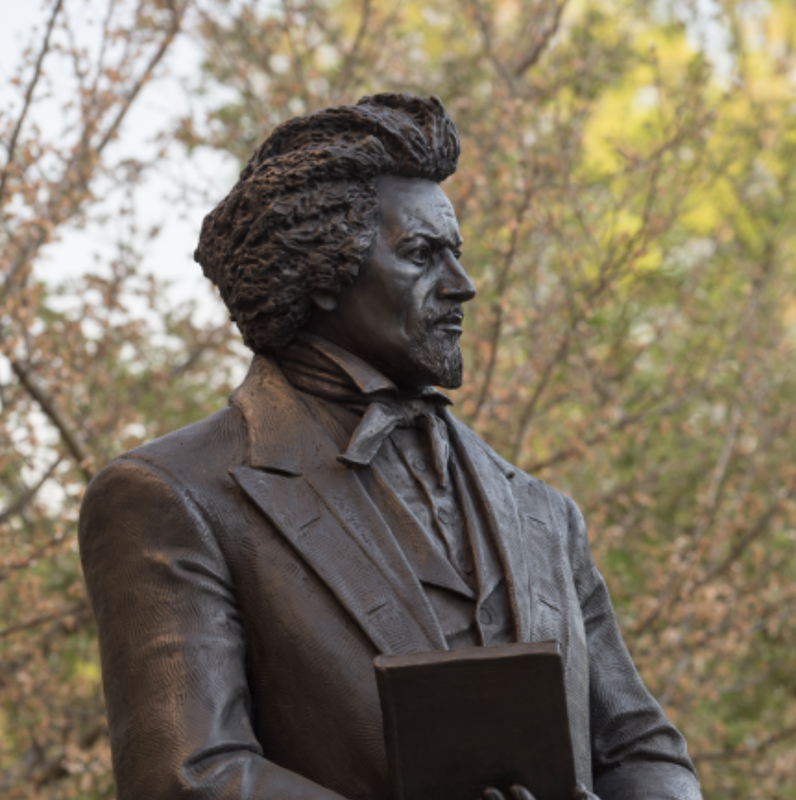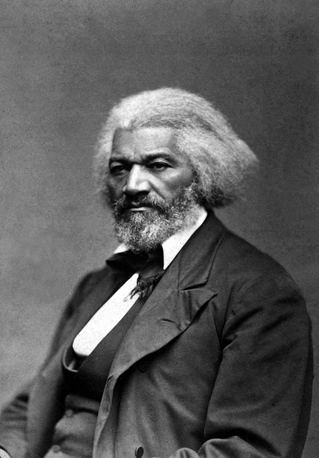Heroes - Lives to Learn From
February
Honesty & Justice Love of Country Loyalty
February
Honesty & Justice Love of Country Loyalty
Justice - Susan B. Anthony (1820-1906)
|
Susan B. Anthony, a courageous fighter for equal justice in the country that she loved, did not live to see the movement she is synonymous with—votes for women—achieve its goal. Nonetheless, she will go down in history as one of women's suffrage most energetic advocates. Born to a Quaker family in Adams, Massachusetts, Anthony was educated alongside her brothers (unusual for that time). She met Frederick Douglass and William Lloyd Garrison and became an avid abolitionist by the age of 17, speaking out against slavery even when some thought it inappropriate for a woman to speak out publicly.
Alongside her friend Elizabeth Cady Stanton, Susan B. Anthony founded the American Equal Rights Association to fight for women's right to vote. Though the movement had been unsuccessful, Anthony voted for President in 1872 in Rochester, New York. She was arrested! (Read the full story in Heart on Fire below). Her case drew even more attention to the women's suffrage movement, and eventually Anthony became the head of a consolidated organization for women's suffrage, the National Woman Suffrage Association. Fourteen years after Anthony's death in 1906, Congress passed the 19th Amendment, ensuring that women had the right to vote. |
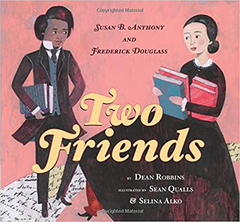
Two Friends. * Dean Robbins. Illustrated by Sean Qualls and Selina Alko. Orchard Books, 2016. (K-3) Justice, Civic Courage, Friendship
Susan B. Anthony and Frederick Douglass were neighbors in mid-nineteenth century Rochester, New York. Each was self-taught, and grew up experiencing discrimination of the time (directed toward women and African Americans). Each worked diligently for the rights of their communities - for education, for the vote, and for equal opportunity in public life. Not surprisingly, the two became friends. In this book, on a snowy evening, they reminisce on their parallel struggles. Susan and Frederick supported each other’s causes, hopeful of success, and confident of the just nature of their endeavors. (The book does whitewash tough stuff: the friendship was strained to breaking when Douglass failed to support women's rights as part of the fifteenth amendment that granted black men the right to vote, but the volume is not incorrect in stating that he theoretically supported the cause; just not at that moment.) *Available on Epic!
Susan B. Anthony and Frederick Douglass were neighbors in mid-nineteenth century Rochester, New York. Each was self-taught, and grew up experiencing discrimination of the time (directed toward women and African Americans). Each worked diligently for the rights of their communities - for education, for the vote, and for equal opportunity in public life. Not surprisingly, the two became friends. In this book, on a snowy evening, they reminisce on their parallel struggles. Susan and Frederick supported each other’s causes, hopeful of success, and confident of the just nature of their endeavors. (The book does whitewash tough stuff: the friendship was strained to breaking when Douglass failed to support women's rights as part of the fifteenth amendment that granted black men the right to vote, but the volume is not incorrect in stating that he theoretically supported the cause; just not at that moment.) *Available on Epic!
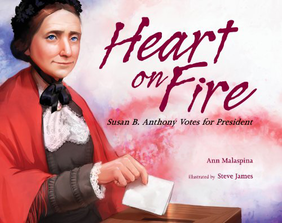
Heart on Fire: Susan B. Anthony Votes for President. Anna Malaspina. Illustrated by Steve James. Albert Whitman & Co., 2012.
(2-4) Courage, Justice
Her entire life was instructive, but this fine picture focuses on Susan B. Anthony's courageous decision to vote for President in 1872 (decades before women had the right to vote) and the judge's infamous verdict of "guilty." A leader in the women's suffrage movement, Anthony defied public ridicule (insults and eggs thrown at her), arrest, and trial, as she led the fight for women's rights. Beautifully illustrated. This volume covers just one courageous incident in her life. For a fuller biography, see the Alexandra Wallner biography.
(2-4) Courage, Justice
Her entire life was instructive, but this fine picture focuses on Susan B. Anthony's courageous decision to vote for President in 1872 (decades before women had the right to vote) and the judge's infamous verdict of "guilty." A leader in the women's suffrage movement, Anthony defied public ridicule (insults and eggs thrown at her), arrest, and trial, as she led the fight for women's rights. Beautifully illustrated. This volume covers just one courageous incident in her life. For a fuller biography, see the Alexandra Wallner biography.
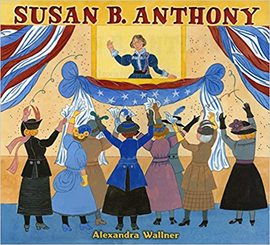
Susan B. Anthony. Alexandra Wallner.
Holiday House, 2012. (2-6) Courage, Love of Country, Justice
A short, but rich introduction to one of America's bravest women. Susan B. Anthony was an early reader, and her parents believed in education for girls as well as boys. When Susan informed her father that the local school would not teach her Mathematics (only for boys), her father, a mill owner, started a school where boys and girls would learn the same subjects. Susan's life unfolds against that backdrop, as she challenges her father to promote mill girls over men, and goes on to challenge Americans to award the vote to women. She wasn't afraid to stand before a crowd, speak out, and take the eggs thrown at her. She also wasn't afraid to go to jail. Unfortunately, she did not live to see the passage of the 19th Amendment which guaranteed women the right to vote. This short volume contains much information, intriguingly presented and with jewel-like folk art enlivening its pages. A great read-aloud right through sixth grade.
Holiday House, 2012. (2-6) Courage, Love of Country, Justice
A short, but rich introduction to one of America's bravest women. Susan B. Anthony was an early reader, and her parents believed in education for girls as well as boys. When Susan informed her father that the local school would not teach her Mathematics (only for boys), her father, a mill owner, started a school where boys and girls would learn the same subjects. Susan's life unfolds against that backdrop, as she challenges her father to promote mill girls over men, and goes on to challenge Americans to award the vote to women. She wasn't afraid to stand before a crowd, speak out, and take the eggs thrown at her. She also wasn't afraid to go to jail. Unfortunately, she did not live to see the passage of the 19th Amendment which guaranteed women the right to vote. This short volume contains much information, intriguingly presented and with jewel-like folk art enlivening its pages. A great read-aloud right through sixth grade.
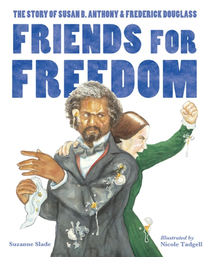
Friends for Freedom: The Story of Susan B. Anthony and Frederick Douglass. Suzanne Slade. Illustrated by Nicole Tadgell. Charlesbridge, 2016. (2-6)
Like Two Friends (above), this book tells the story of the unlikely (or at least unconventional) friendship between two great champions of justice, Susan B. Anthony and Frederick Douglass. Both were in strong support of one another's causes, and spoke out together for the rights of women and African-Americans. The book, accompanied by imaginative watercolors, does not shy away from Douglass and Anthony's major conflict—over the Fifteenth Amendment, which granted voting rights to African-Americans but not to women—but emphasizes how much these two unlikely friends fought for one another's causes and persevered in their work at a time when a friendship—and especially a partnership in fighting for equal rights—between a black man and a white woman was frowned upon by society at large.
Like Two Friends (above), this book tells the story of the unlikely (or at least unconventional) friendship between two great champions of justice, Susan B. Anthony and Frederick Douglass. Both were in strong support of one another's causes, and spoke out together for the rights of women and African-Americans. The book, accompanied by imaginative watercolors, does not shy away from Douglass and Anthony's major conflict—over the Fifteenth Amendment, which granted voting rights to African-Americans but not to women—but emphasizes how much these two unlikely friends fought for one another's causes and persevered in their work at a time when a friendship—and especially a partnership in fighting for equal rights—between a black man and a white woman was frowned upon by society at large.
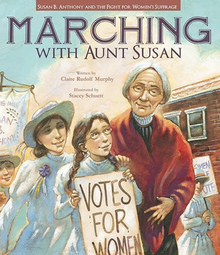
Marching with Aunt Susan: Susan B. Anthony and the Fight for Women's Suffrage. Claire Rudolf Murphy. Illustrated by Stacey Schuett. Peachtree, 2011. (2-6)
A first-person story from the perspective of Bessie, who wants to join her father and brothers on a hike but, in 1896, is not permitted to do so—instead, she is relegated to the home, where she must help her mother help set up for the women's suffrage tea. There she meets Susan B. Anthony—it is only the beginning of Bessie's involvement in the movement for rights for women, and of the young reader's tour of the scenes of women's suffrage in the 1890s. Accompanied by winsome, painted illustrations. A fun element of this story is that it is inspired by the historical 1896 diary of Bessie Keith Pond, age 10, who grew up in Berkeley, California during the women's suffrage movement. Susan B. Anthony herself does not loom very large in this story, but it is a vivid portrayal of the fight for women's suffrage during this time.
A first-person story from the perspective of Bessie, who wants to join her father and brothers on a hike but, in 1896, is not permitted to do so—instead, she is relegated to the home, where she must help her mother help set up for the women's suffrage tea. There she meets Susan B. Anthony—it is only the beginning of Bessie's involvement in the movement for rights for women, and of the young reader's tour of the scenes of women's suffrage in the 1890s. Accompanied by winsome, painted illustrations. A fun element of this story is that it is inspired by the historical 1896 diary of Bessie Keith Pond, age 10, who grew up in Berkeley, California during the women's suffrage movement. Susan B. Anthony herself does not loom very large in this story, but it is a vivid portrayal of the fight for women's suffrage during this time.
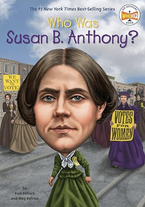
Who Was Susan B. Anthony? Pam Pollack and Meg Belviso. Penguin Workshop, 2014. (3-6)
From the popular Who Was series, this book tells the story of Susan B. Anthony's life from her insistence on equal pay as a teacher to traveling the United States and Europe to speak up for the rights of women. Vivid black-and-white illustrations and powerful anecdotes from Anthony's life round out a slim chapter book for older grade school kids.
From the popular Who Was series, this book tells the story of Susan B. Anthony's life from her insistence on equal pay as a teacher to traveling the United States and Europe to speak up for the rights of women. Vivid black-and-white illustrations and powerful anecdotes from Anthony's life round out a slim chapter book for older grade school kids.
Honesty & Justice - Frederick Douglass (1818-1895)
"The life of the nation is secure only while the nation is
honest, truthful, and virtuous." Frederick Douglass
"The life of the nation is secure only while the nation is
honest, truthful, and virtuous." Frederick Douglass
|
Frederick Douglass was the most photographed man of the nineteenth century, sitting for over 160 stern and sometimes confrontational photos. He believed in the power of photography to end slavery. "The camera does not lie," he said. John Stauffer's book, Picturing Frederick Douglass (2015) provides a wonderful analysis of Douglass's fascination with photography.
|
For his unflinching honesty about his life experience and for his relentless pursuit of justice, our civic hero this month is Frederick Douglass. When asked for career advice once, Douglass replied with three words: "Agitate, agitate, agitate." Born into slavery in Maryland, he lost both his parents before age six, but was fascinated by the written word and taught himself to read. "Knowledge is the pathway from slavery to freedom," he often said. His encounter with the book, The Columbian Orator (published in 1797) put him on a path to rhetorical agitation for the abolition of slavery. He was sold to a "slave-breaker" master in 1833 and endured so many floggings that his back told the story his whole life. Sustained by his faith and by his ingenuity, he escaped slavery in 1838, settled in New Bedford, Massachusetts, and began speaking, preaching, and writing on the injustice of slavery. Sojourner Truth, Harriet Tubman, Elizabeth Cady Stanton, and abolitionist newspaper publisher William Lloyd Garrison were among his friends. His Narrative of the Life of Frederick Douglass, an American Slave (1845) brought him international renown, and his eloquence drew crowds both in America and abroad.
During the Civil War Lincoln sought his counsel and in 1863, when black soldiers were finally admitted to Union ranks, Douglass campaigned for their recruitment in his famous broadside "Men of Color to Arms!" His own son fought in Massachusetts 54th division. Douglass's long and bitter struggle against racism did not lead him to love of country, but he was in love with truth and justice. And he often moved mountains with his honest analysis and righteous anger. In the words of a woman who admired him, he was "majestic in his wrath." Though Douglass did not know his birthdate, he chose to celebrate it on February 14. Below we feature introductory biographies for all ages. |
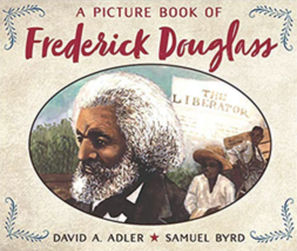
A Picture Book of Frederick Douglass.* David Adler.
Illustrated by Samuel Byrd. Holiday, 1993. (2-4)
A detailed recounting of the astonishing life of Frederick Douglass. Largely self-taught, enslaved Frederick found encouragement in the Bible, and did not accept enslavement as his lot for life. He witnessed and endured its horrors first hand (flogging of his aunt and himself), escaped to the north, wrote with passion of his experience, became the first African-American publisher and most influential spokesmen for civil rights in the antebellum period. The book covers Douglass's work in the Civil War to assemble a black regiment and his lifelong support for women's rights. *Available on Epic!
Illustrated by Samuel Byrd. Holiday, 1993. (2-4)
A detailed recounting of the astonishing life of Frederick Douglass. Largely self-taught, enslaved Frederick found encouragement in the Bible, and did not accept enslavement as his lot for life. He witnessed and endured its horrors first hand (flogging of his aunt and himself), escaped to the north, wrote with passion of his experience, became the first African-American publisher and most influential spokesmen for civil rights in the antebellum period. The book covers Douglass's work in the Civil War to assemble a black regiment and his lifelong support for women's rights. *Available on Epic!
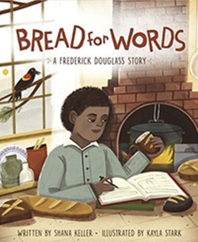
Bread for Words* Shana Keller. Illustrated by Kayla Stark. Sleeping Bear Press, 2020. (K-4) Black History Month, Perseverance.
Frederick Douglass, growing up as a slave, has many questions. Why is he a slave, why can’t he learn to read like the white boys? He learns that reading is the first step to being free. In this fictionalized first-person narrative, we see him devote himself to learning wherever he can, even trading bread for knowledge. His persistence in the pursuit of knowledge pays off. This is a fine portrayal of his early life. *Available on Epic!
Frederick Douglass, growing up as a slave, has many questions. Why is he a slave, why can’t he learn to read like the white boys? He learns that reading is the first step to being free. In this fictionalized first-person narrative, we see him devote himself to learning wherever he can, even trading bread for knowledge. His persistence in the pursuit of knowledge pays off. This is a fine portrayal of his early life. *Available on Epic!
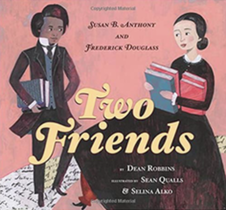
Two Friends. * Dean Robbins. Illustrated by Sean Qualls and Selina Alko. Orchard Books, 2016. (K-3) Justice, Civic Courage, Friendship
Susan B. Anthony and Frederick Douglas were neighbors in mid-nineteenth century Rochester, New York. Each was self-taught, and grew up experiencing discrimination of the time (directed toward women and African Americans). Each worked diligently for the rights of their communities - for education, for the vote, and for equal opportunity in public life. Not surprisingly, the two became friends. In this book, on a snowy evening, they reminisce on their parallel struggles. Susan and Frederick supported each other’s causes, hopeful of success, and confident of the just nature of their endeavors. (The book does whitewash tough stuff: the friendship was strained to breaking when Douglass failed to support women's rights as part of the fifteenth amendment that granted black men the right to vote, but the volume is not incorrect in stating that he theoretically supported the cause; just not at that moment.) *Available on Epic!
Susan B. Anthony and Frederick Douglas were neighbors in mid-nineteenth century Rochester, New York. Each was self-taught, and grew up experiencing discrimination of the time (directed toward women and African Americans). Each worked diligently for the rights of their communities - for education, for the vote, and for equal opportunity in public life. Not surprisingly, the two became friends. In this book, on a snowy evening, they reminisce on their parallel struggles. Susan and Frederick supported each other’s causes, hopeful of success, and confident of the just nature of their endeavors. (The book does whitewash tough stuff: the friendship was strained to breaking when Douglass failed to support women's rights as part of the fifteenth amendment that granted black men the right to vote, but the volume is not incorrect in stating that he theoretically supported the cause; just not at that moment.) *Available on Epic!
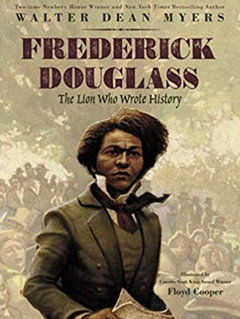
Frederick Douglass: The Lion Who Wrote History. Walter Dean Myers. Illustrated by Floyd Cooper. Harper Collins, 2017. (2-6) Love of our Country's Ideals, Justice, Lives to Learn From
A rich picture book biography of Frederick Douglass, the great orator, writer, newspaper publisher, and advocate for the abolition of slavery. Born a slave in Maryland in 1818, Douglass taught himself to read, and later wrote: “Once you learn to read, you will be forever free.” When he escaped slavery, he became a leading voice for abolitionism, writing his own autobiography and publishing an abolitionist newspaper. In the Civil War, Douglass pressed Lincoln for emancipation and urged that blacks be allowed to fight for the cause. Lush illustrations trace Douglass’s early life, his struggle for an education and freedom, and his adult quest to change the United States for the better, seeking its ideals of equality and freedom for all. Appropriate for children second grade and older. This is not a younger child’s book, despite publisher recommendation.
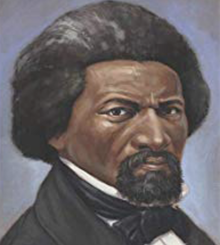
Frederick's Journey. Doreen Rappaport. Illustrated by London Ladd. Big Words Biography, 2018. (3-6) Justice, Courage
A powerfully illustrated and powerfully told true story. We follow Frederick Douglass from his childhood as a beloved grandson, but an abused slave to several different masters. Douglass's quest for literacy defined his youth, and his refusal to deny or foresake his own human dignity defined his life. He escaped to freedom, then formally bought his freedom, and became publisher of The North Star, an abolitionist newspaper. (Slaves followed the North Star to freedom with underground railroad conductor Harriet Tubman.) His writing, his meetings with Lincoln and advocacy for African-American soldiers in the Civil War are all spotlighted. A moving and well told account of his life-long quest for justice for all, and extraordinary personal courage.
A powerfully illustrated and powerfully told true story. We follow Frederick Douglass from his childhood as a beloved grandson, but an abused slave to several different masters. Douglass's quest for literacy defined his youth, and his refusal to deny or foresake his own human dignity defined his life. He escaped to freedom, then formally bought his freedom, and became publisher of The North Star, an abolitionist newspaper. (Slaves followed the North Star to freedom with underground railroad conductor Harriet Tubman.) His writing, his meetings with Lincoln and advocacy for African-American soldiers in the Civil War are all spotlighted. A moving and well told account of his life-long quest for justice for all, and extraordinary personal courage.
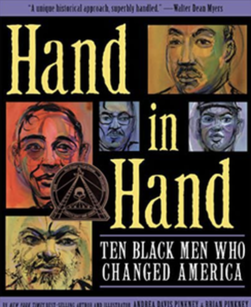
Hand in Hand. Ten Black Men Who Changed America. Andrea Davis Pinkney and Brian Pinkney. Little, Brown Books, 2010. (5-6)
These are ten lively (approximately) twenty-five page biographies of men who were "links in the freedom chain." The Pinkneys bring their signature style to profile Benjamin Banneker, Frederick Douglass, Booker T. Washington, W.E.B. DuBois, A. Philip Randolph, Jackie Robinson, Malcolm X, Martin Luther King, Jr., Thurgood Marshall, and Barack Obama. Any one of the lives might be read over the course of a week in circle time at upper grades. The text sings. For example, on eighteenth century almanac author Benjamin Banneker learning his numbers and studying constellations: "Benjamin was now math-happy and starstruck." On Thurgood Marshall: “He made people feel comfortable by speaking with the ease of a friend but the conviction of a leader.” Read and learn!
These are ten lively (approximately) twenty-five page biographies of men who were "links in the freedom chain." The Pinkneys bring their signature style to profile Benjamin Banneker, Frederick Douglass, Booker T. Washington, W.E.B. DuBois, A. Philip Randolph, Jackie Robinson, Malcolm X, Martin Luther King, Jr., Thurgood Marshall, and Barack Obama. Any one of the lives might be read over the course of a week in circle time at upper grades. The text sings. For example, on eighteenth century almanac author Benjamin Banneker learning his numbers and studying constellations: "Benjamin was now math-happy and starstruck." On Thurgood Marshall: “He made people feel comfortable by speaking with the ease of a friend but the conviction of a leader.” Read and learn!
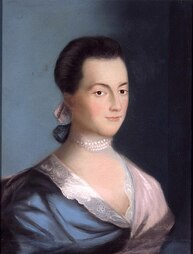
Love of Country -Abigail Adams (1744-1818)
Witty, sharp, and enthusiastic about partnership with her husband John Adams, Abigail Smith Adams is regarded as a "Founding Mother." From the start, Abigail shared her husband John's passion for liberty and American independence, and while the Revolution raged, schooled their four children in love of their country and love of virtue. While John pressed for independence in Philadelphia, it was Abigail who made sure son John Quincy Adams had memories of key events of the Revolution -- taking him by the hand to Penn Hill where they witnessed the bloody Battle of Bunker Hill (June 1775) and the British burning of Charleston, Massachusetts. Frequently separated during the first twenty years of their marriage, Abigail and John exchanged more than twelve hundred letters, in which she made sure he understood events on the home front (which she managed largely by herself). She shared her husband's life-long rejection of slavery, which she regarded as a moral evil and a threat to the republic. She frequently counseled John on what she regarded as the best path forward. Her March 1776 letter, encouraging him to "remember the ladies," when writing new laws and warning him that "all men would be tyrants" if allowed, inspired future generations of American women on the path to suffrage. When she joined John in Paris, where he served as an American minister in the 1780s, she quickly made a friend of Thomas Jefferson. She cared for his daughter Polly when in London, and maintained an affectionate correspondence with the Virginia architect of independence for decades. Most remarkable, though was the intellectual companionship and emotional intimacy of John and Abigail's marriage and letters. They continue to inspire subsequent generations with their concern for the flourishing of the new American republic and for each other.
Witty, sharp, and enthusiastic about partnership with her husband John Adams, Abigail Smith Adams is regarded as a "Founding Mother." From the start, Abigail shared her husband John's passion for liberty and American independence, and while the Revolution raged, schooled their four children in love of their country and love of virtue. While John pressed for independence in Philadelphia, it was Abigail who made sure son John Quincy Adams had memories of key events of the Revolution -- taking him by the hand to Penn Hill where they witnessed the bloody Battle of Bunker Hill (June 1775) and the British burning of Charleston, Massachusetts. Frequently separated during the first twenty years of their marriage, Abigail and John exchanged more than twelve hundred letters, in which she made sure he understood events on the home front (which she managed largely by herself). She shared her husband's life-long rejection of slavery, which she regarded as a moral evil and a threat to the republic. She frequently counseled John on what she regarded as the best path forward. Her March 1776 letter, encouraging him to "remember the ladies," when writing new laws and warning him that "all men would be tyrants" if allowed, inspired future generations of American women on the path to suffrage. When she joined John in Paris, where he served as an American minister in the 1780s, she quickly made a friend of Thomas Jefferson. She cared for his daughter Polly when in London, and maintained an affectionate correspondence with the Virginia architect of independence for decades. Most remarkable, though was the intellectual companionship and emotional intimacy of John and Abigail's marriage and letters. They continue to inspire subsequent generations with their concern for the flourishing of the new American republic and for each other.
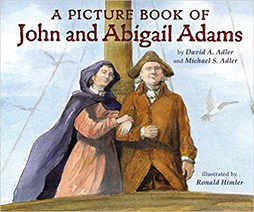
A Picture Book of John and Abigail Adams. David and Michael Adler. Illustrated by Ronald Himler. Holiday House, 2010 (1-3)
A lovely introductory presentation of America's second First Family! Presents Abigail as a fellow laborer in the vineyard for liberty and the American republic. 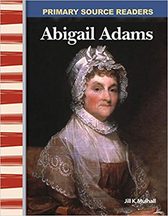
Abigail Adams: Early America. Jill Mulhall. Teacher Created Materials, 2004(4-6)
Introduce middle school students to Abigail in her own words. This is a primary source volume of her letters and touches on topics from Revolution (Stamp Act, Boston Massacre, etc.) to women's rights and family life. 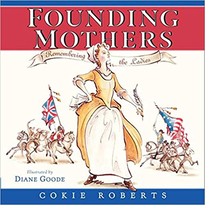
Founding Mothers: Remembering the Ladies. Cokie Roberts.
Illustrated by Diane Goode. Harper Collins, 2014 In this lively, well-written book journalist Cokie Roberts introduces children to the women who built and bettered our nation. Here she highlights the lives and accomplishments of quintessential Founding Mothers, Abigail Adams and Martha Washington, but also spotlights lesser known figures such as Mercy Otis Warren, the first person to write a comprehensive history of the American Revolution. |
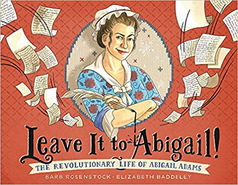
Leave It To Abigail. The Revolutionary Life of Abigail Adams. Barb Rosenstock. Illustrated by Elizabeth Bradley. Little Brown Books, 2020. (K-3) From the first, Abigail did not do what she was expected to do. As a girl, she was more interested in reading than in needlepoint, held strong opinions and wielded a wicked quill pen. She married for love instead of status -- a struggling young lawyer, John Adams, who led the push for independence in the American Revolution and worked tirelessly to form the government of the young country. If she was not by his side, Abigail was always there with sharp and witty letters to advise him. When he was away for years at a time in Europe, she ran the farm and educated their five children. But she also accompanied him to London to represent the young nation. Abigail and John had a true partnership, and Abigail excelled as wife, mother, diplomat, and First Lady. This tribute to her is an inspiring story, illustrated with watercolors on a background of cross-stitched linen.
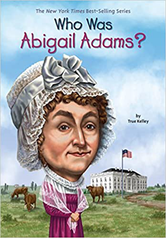
Who Was Abigail Adams? True Kelley. Illustrated by John O'Brien. Penguin Books, 2014 (3-6)
This short chapter book is an engaging middle grade presentation of Abigail as intelligent wife, mother, and trusted advisor to her liberty-loving husband. It opens with the incident of taking John Quincy to Penn's Hill to watch the Battle of Bunker Hill. Very well done. |
Justice - Thurgood Marshall (1908-1998)
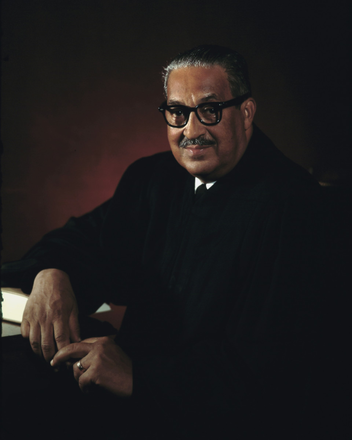
Our February focus on justice and on Black History make "Justice Thurgood Marshall" a natural hero for this month.
The Baltimore-born son of a train porter and a school teacher, and the great-grandson of slaves on both sides of his family, Thurgood Marshall became a constitutional lawyer, civil rights activist and the first African American Supreme Court Justice. He knew his mind from an early age, insisting at age seven that his parents change his name from "Thoroughgood" to "Thurgood." They did. Justice Marshall credited his father with his vocation to the law because Dad took his son to watch court cases, and encouraged post-facto re-litigation of what they'd just seen. From his mother, Marshall learned a deep respect for the U.S. Constitution and the rule of law. Also as a high-spirited elementary school student, Thurgood profited from regular detention (you read that right), in which his assignment was to memorize various parts of the Constitution. By the time he graduated from eighth grade, he could recite the entire U.S. Constitution from memory! As an undergraduate at Lincoln College, Thurgood continued to sow wild oats and was twice suspended for prankster antics against fellow students. Classmate Langston Hughes (the famous poet) characterized Marshall as "rough and ready, loud and wrong." But not for long. (There's hope for those wild boys in your class!)
Thurgood's life took on greater seriousness of purpose after he married Vivien Buster Burey, and began to study law at Howard University. Ranked first in his class at graduation in 1933, he focused on civil rights and individual liberty. As Chief Counsel for the NAACP (National Association for the Advancement of Colored People), his major triumph came in 1954, when he argued Brown vs Board of Education before the Supreme Court and won. The landmark case overturned segregation as an option. But he had just begun. He served as Court of Appeals judge appointed by JFK, and Solicitor General for Lyndon Johnson before Johnson tapped him for the Supreme Court n 1967. There he was a major force for the next 24 years. The biographies for children below help bring his drive, determination, and commitment to justice to life.
The Baltimore-born son of a train porter and a school teacher, and the great-grandson of slaves on both sides of his family, Thurgood Marshall became a constitutional lawyer, civil rights activist and the first African American Supreme Court Justice. He knew his mind from an early age, insisting at age seven that his parents change his name from "Thoroughgood" to "Thurgood." They did. Justice Marshall credited his father with his vocation to the law because Dad took his son to watch court cases, and encouraged post-facto re-litigation of what they'd just seen. From his mother, Marshall learned a deep respect for the U.S. Constitution and the rule of law. Also as a high-spirited elementary school student, Thurgood profited from regular detention (you read that right), in which his assignment was to memorize various parts of the Constitution. By the time he graduated from eighth grade, he could recite the entire U.S. Constitution from memory! As an undergraduate at Lincoln College, Thurgood continued to sow wild oats and was twice suspended for prankster antics against fellow students. Classmate Langston Hughes (the famous poet) characterized Marshall as "rough and ready, loud and wrong." But not for long. (There's hope for those wild boys in your class!)
Thurgood's life took on greater seriousness of purpose after he married Vivien Buster Burey, and began to study law at Howard University. Ranked first in his class at graduation in 1933, he focused on civil rights and individual liberty. As Chief Counsel for the NAACP (National Association for the Advancement of Colored People), his major triumph came in 1954, when he argued Brown vs Board of Education before the Supreme Court and won. The landmark case overturned segregation as an option. But he had just begun. He served as Court of Appeals judge appointed by JFK, and Solicitor General for Lyndon Johnson before Johnson tapped him for the Supreme Court n 1967. There he was a major force for the next 24 years. The biographies for children below help bring his drive, determination, and commitment to justice to life.
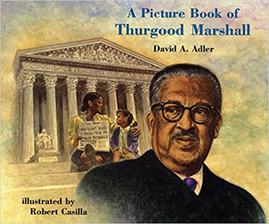
A Picture Book of Thurgood Marshall. David Adler. Illustrated by Robert Casilla. Holiday House, 1997. (K-2)
Adler brings his signature simple but insightful style to this work, which is an excellent introduction for young children. He doesn't hide the young Thurgood's faults (antics in school, punishments, rebelliousness), but shows how a strong-willed boy with high ideals and perseverance made his country a better place. |
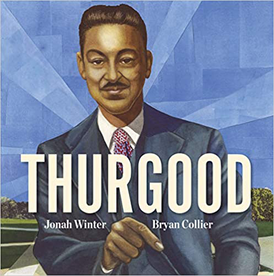
Thurgood. Jonah Winter. Illustrated by Bryan Collier. Schwartz and Wade, 2019. (2-5)
Engagingly written, stunningly illustrated biography of an amazing boy-turned-lawyer. "Normally, you don't look at a sandbox full of toddlers and say 'Little Jimmy there is going to become a world famous lawyer.' But there was this little boy named "Thoroughgood, who was by all accounts a born lawyer. At age six, he convinced his parents to legally change his name to "Thurgood." Read the rest - from boyhood to Supreme Court. It's a stunner of a book. |
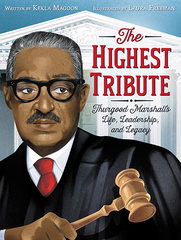
The Highest Tribute. Thurgood Marshall's Life, Leadership and Legacy. Kekla Magoon. Illustrated by Laura Freeman. Quill Tree Books, 2021. (1-3)
The fabulous illustrations draw the younger reader into Thurgood Marshall's life and legacy as “Mr. Civil Rights.” A concise and motivating biography of the boy-turned-man who decided if something in the world needed changing, he'd change it. His legacy was to help make segregation and discrimination unlawful. |
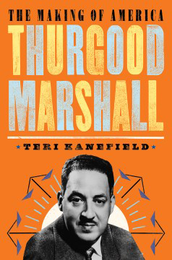
Thurgood Marshall. The Making of America #6. Teri Kanefield. Abrams Books, 2020. (5-6) 256 pgs
A very thorough biography of Thurgood Marshall that details not only his rise through the judiciary, but also the cases he championed in historical context. Great reference for student reports. |
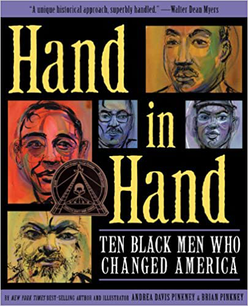
Hand in Hand. Ten Black Men Who Changed America. Andrea Davis Pinkney and Brian Pinkney. Little, Brown Books, 2010. (5-6)
An excellent 25 page write-up that could be read at Circle over a week to older students. Includes background on his strong-willed and determined slave grandfather, as well as Thurgood's grade school antics, for which he was sentenced to what classmates called the DCD i.e. "Dreaded Constitutional Dungeon." Great overview of Marshall's impressive life. Others profiled in the volume include Benjamin Banneker, Frederick Douglass, Booker T. Washington, W.E.B. DuBois, A. Philip Randolph, Jackie Robinson, Malcolm X, Martin Luther King, Jr., and Barack Obama.
An excellent 25 page write-up that could be read at Circle over a week to older students. Includes background on his strong-willed and determined slave grandfather, as well as Thurgood's grade school antics, for which he was sentenced to what classmates called the DCD i.e. "Dreaded Constitutional Dungeon." Great overview of Marshall's impressive life. Others profiled in the volume include Benjamin Banneker, Frederick Douglass, Booker T. Washington, W.E.B. DuBois, A. Philip Randolph, Jackie Robinson, Malcolm X, Martin Luther King, Jr., and Barack Obama.
Honesty - Abraham Lincoln (1809 -1865)
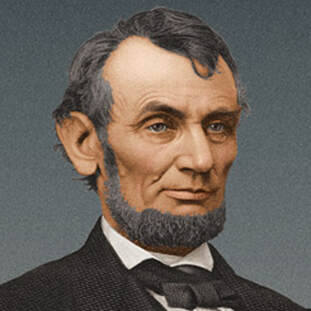
It is hard to imagine an individual who embodies honesty, love of country, loyalty, and concern for justice more fully than Abraham Lincoln. Our blog post in February (Telling Our Stories) spotlights Lincoln's honesty. The books below showcase various aspects of this extraordinary man's life. Our sixteenth president came from humble beginnings and experienced a great deal of failure and tragedy in his life. He led the nation through its darkest hour (the Civil War) and signed the Emancipation Proclamation that would end of slavery. Lincoln persevered through his many trials, never losing his inner compass, nor his sense of humor.
This February we celebrate his lifelong dedication to the ideals of the republic he helped create: liberty, equality, and justice. His personal credo:
"I am not bound to win, but I am bound to be true. I am not bound to succeed, but I am bound to live by the light that I have. I must stand with anybody that stands right, and stand with him while he is right, and part with him when he goes wrong."
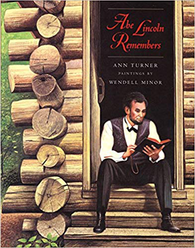
Abe Lincoln Remembers. Ann Turner.
Illustrated by Wendell Minor. Harper Collins, 2001. (2-4) Courage, Humility, Kindness This deceptively simple book yields profound insight into our nation's 16th president. On the night that Lincoln will attend Ford's Theater with his wife, he looks back on his life from log-cabin childhood to the presidency. Emerging from its beautifully illustrated pages is the story of a kind, humble, forgiving man, who loved his country, led it in hard times, and grieved over the deaths of the Civil War, even while he rejoiced in freedoms won. This is not a history text, but a personal portrait of a man who learned from his frontier boyhood, sought his own freedom (from his father as a young man), read voraciously, studied and worked hard, loved his wife ("bright and brave, like a flag crackling in the wind") and children ("though I didn't like it when Tad drove his cart and goats down the White House hall.") and most of all the nation he served. A wonderful way for US to remember Abe Lincoln. Excellent fit with the Core Knowledge Civil War units in second grade. |
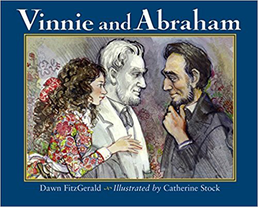
Vinnie and Abraham. Dawn Fitzgerald.
Illustrated by Catherine Stock. Charlesbridge, 2009. (2-5) Inspiring picture-book biography of Vinnie Ream, the self-taught artist and accomplished American sculptress, who never gave up. Born (1847) and raised in the Wisconsin territory, she was admiring of, and eager to sculpt, Abraham Lincoln. When she and her family moved to DC during the Civil War, Vinnie managed to convince the President to sit for her. After Lincoln's assassination, she became (at 18) the youngest artist and first woman to receive a federal commission. She sculpted, from marble, the Lincoln statue that now stands in the Capitol (statuary hall). The book is a tribute to her persistence, courage to step outside prescribed bounds, and great love for a great man. |
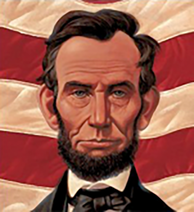
Abe’s Honest Words: The Life of Abraham Lincoln. * Doreen Rappaport.
Illustrated by Kadir Nelson. Hyperion Books, 2008 (2-4) A poetic and beautifully illustrated presentation of Lincoln’s life and accomplishments. Rappaport weaves Lincoln’s own words into her text, which follows him from lanky backwoods boy to leader of the nation locked in a deadly civil war to end slavery. Compellingly told, an outstanding introduction to the work of Lincoln, slavery, and the Civil War. The Gettysburg Address closes the book.*Available on Epic! |
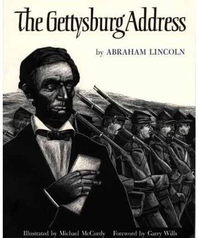
The Gettysburg Address. Abraham Lincoln.
Illustrated by Michael McCurdy. Houghton Mifflin, 1995. (2) Haunting black and white drawings illustrate one of the simplest and most direct statements of our nation’s meaning. |
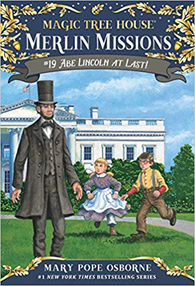
Abe Lincoln at Last! (Magic Treehouse Book: Merlin Mission) Mary Pope Osborne. Illustrated by Sal Murdocca. Chapter book, 144pages. Random House, 2013 (2-5)
|
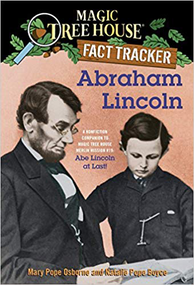
Abraham Lincoln: A Nonfiction Companion to Magic Treehouse Abe Lincoln at Last! Mary Pope Osborne, Natalie Pope Boynce. Illustrated by Sal Murdocca. Random House , 2011. (2-5)
|
In February, we also celebrate Presidents’ Day . Please look for recommended books on the President's Day tab on our Holidays page.
February is Black History Month. Be sure to check out the Black History Month tab in the Holidays and More section. You'll find many additional biographies and stories there.

